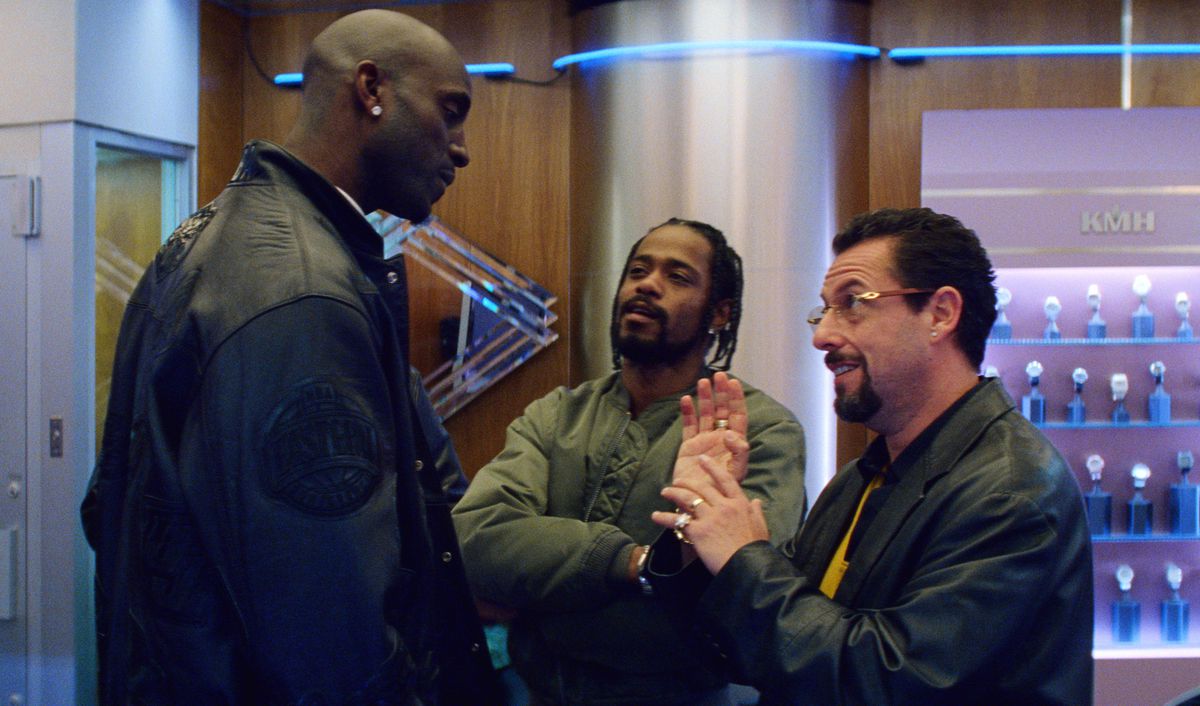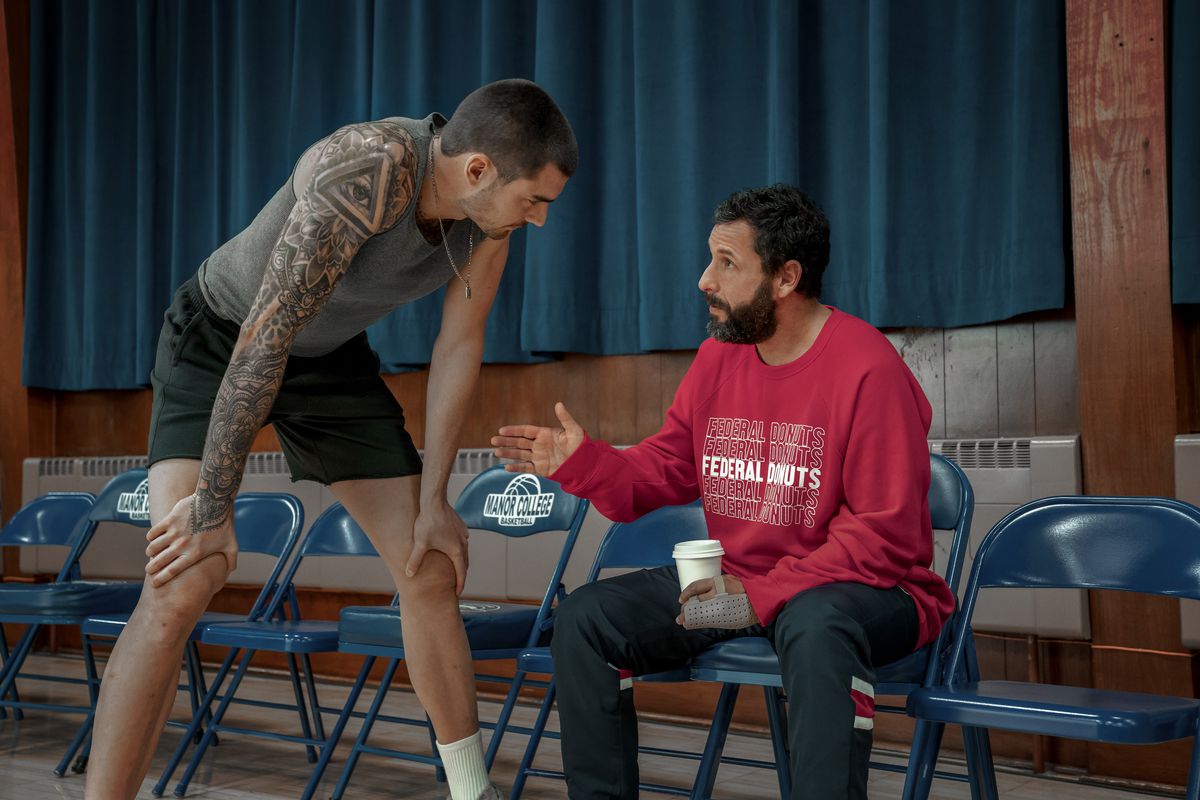Toward the top of Ben Affleck’s sneaker procedural Air, the bigwigs of Nike’s basketball division sit around a conference room table debating the merits of players in the 1984 NBA draft. They have a $250,000 budget to split between three prospects, which means they’ll inevitably be outbid by the giants at Converse and Adidas for the right to sponsor the draft’s top picks. So they look further down the draft board: The fifth pick, Charles Barkley, is mired in “clubhouse issues,” and “nobody is going to want to see him on TV”; the 16th pick, John Stockton, played his college ball at Gonzaga, and “no one even knows where that is”; Melvin Turpin, drafted sixth, seems like the safest bet — he apparently has “great vision,” though Sonny Vaccaro (Matt Damon) notes that he only averages one assist per game. In 2023, of course, we know that Barkley and Stockton are Hall of Famers, Gonzaga is a perennial powerhouse, and Turpin never did much of anything in the league.
These kinds of nods to in-the-know viewers, hidden throughout Air by rookie screenwriter Alex Convery, are nothing new. Since at least 1980, when Kareem Abdul-Jabbar complained about dragging Walton and Laimbeer down the court for 48 minutes in Airplane!, knowing nods to a savvy, basketball-watching audience have been embedded in films that touch on the sport. But a new generation of basketball movie has reflected a new generation of basketball fan, one who’s as versed in collective bargaining agreements, overseas scouting, sports gambling, and shoe deals as they are the on-court product. In a world where every move an NBA GM makes spawns a hundred podcast episodes, Hollywood has adapted, delivering a spate of films that dig deep into aspects of the game that seemed unimaginable in the days of Hoosiers.
In fits and starts, this revolution has happened in sports movies before. Bennett Miller’s Moneyball managed to film the seemingly unfilmable story of a renegade GM and a Yale economist using sabermetrics to find undervalued baseball players. Ivan Reitman’s Draft Day dropped viewers into the war room of the Cleveland Browns during the NFL draft. Even Jerry Maguire, in its own ’90s dramedy way, saw one-time journalist Cameron Crowe excavating some of the esoterica of sports agencies. For fans of those sports, it’s natural to see themselves in these auxiliary characters — think of the overwhelming popularity of fantasy football and baseball, both of which dwarf the audience for NBA fantasy leagues. But basketball culture is driven primarily by Black youth culture, and the inevitable tension between the game and the business interests surrounding it is just now being explored in depth on screen.
High Flying Bird makes that tension its principal obsession. Steven Soderbergh’s 2019 drama is set during an NBA lockout, with the league’s owners and players at an impasse over their new collective bargaining agreement. The film follows the maneuvers of super-agent Ray Burke (an excellent André Holland) as he negotiates with seemingly everyone in the basketball universe, toward ends that aren’t always clear to anyone but him. It’s a dense, cerebral movie that throws its audience in with the sharks and asks them to swim, but it’s devastatingly insightful about the symbiosis of basketball and commerce.
Working from a script by Tarell Alvin McCraney, the playwright behind the story that inspired Moonlight, Soderbergh’s harsh iPhone cinematography stuffs viewers into offices, boardrooms, living rooms, bars, restaurants, gyms, saunas, and anywhere else that the business of basketball is conducted. Fans today are more interested than ever in understanding the way the NBA sausage is made, and Soderbergh doesn’t leave out any of the nasty bits.
“They invented a game on top of a game,” says Spence (Bill Duke), a veteran basketball coach and community fixture in the South Bronx. Spence is the kind of guy who’s been in a sweatsuit for the past 40 years and who still thinks three-pointers and slam dunks are gimmicky; anyone who’s been around the game long enough knows a Spence or two. By putting the thesis of High Flying Bird in his mouth, McCraney and Soderbergh seem to be drawing a contrast between old-school hoopers and money-obsessed new jacks.
It isn’t that simple, though. The lockout is fucking up Spence’s money, too, making it hard to get pros out to his charity events, and illegal for him to advertise them being there. It soon becomes clear that the lockout is everybody’s problem, and the players-first streetball revolution that the movie spends half its run time teasing never materializes. (Like Kevin Durant’s viral Rucker Park pickup game during the last real-life lockout, High Flying Bird’s climactic, off-screen one-on-one game is a one-off.)
The lockout ends because it must end, because the game on top of the game simply feeds too many mouths. It’s a bittersweet but authentic ending, and life has already imitated art: Earlier this month, owners and players agreed in principle on a new CBA, staving off another lockout for at least seven years.

Another prescient basketball film from 2019 was Uncut Gems, Josh and Benny Safdie’s anxiety-inducing look at the sports gambling underworld. Adam Sandler plays Howard Ratner, a jeweler and problem gambler who always thinks his next bet is going to come in big. (Spoiler: It does, until it doesn’t.) The Safdies and Sandler bring Howard to life in part by blurring his very real passion for basketball with his judgment-clouding addiction to betting. His aggressive bets are terrifying, but for the most part, they’re rooted in a deep understanding of the game. Meeting Kevin Garnett is a thrill for Howard for more reasons than the potential to make money off him.
Uncut Gems is set in 2012, when sports betting was broadly illegal in the United States. Today, it’s impossible to watch an NBA broadcast without being bombarded by ads for sportsbooks. Howard’s vocabulary of prop bets, over/unders, and parlays played as insiderish, even seedy, back in 2019. Now it’s commonplace. This has already started to bleed into the game in ugly ways. After a March game in Orlando, a fan accosted Wizards All-Star Bradley Beal outside of the arena, yelling, “You fucked me out of $1,300, you fuck!” Beal rightly retaliated, saying, “I don’t give a fuck about none of your bets or your parlays, bro. That ain’t why I play the game.” We’re living in Howard Ratner’s world now.
Sandler’s hoops fandom extends far beyond his Uncut Gems character, and he let it fuel his 2022 passion project, Hustle. With its dozens of high-profile cameos and deep basketball vocabulary, Hustle is the biggest love letter to the NBA in this wave of movies, but it still offers some pointed critiques of the league’s machinery.
The film follows Sandy Sugerman, an international scout for the Philadelphia 76ers whose life is an endless cycle of low-level games in underlit gyms, fast-food dinners in five-star hotels, and business-class flights to who knows where. Sugerman is promoted to the bench early in the film, but he’s sent back into the field for one final job when beloved team owner Rex Merrick (Robert Duvall) dies and leaves his failson Vince (Ben Foster) in charge. (As an aside, Foster plays the best prick owner in any of these films, slightly outdueling an unbearably smarmy Kyle MacLachlan in High Flying Bird.)

The remainder of Hustle is catnip for amateur draftniks. Sugerman discovers Bo Cruz (real NBA player Juancho Hernangómez), a streetball hustler in work boots, while on assignment in Spain. He practically smuggles Cruz back to Philly when the Sixers’ front office indicates they’re not interested. “There’s 450 players in the NBA, and 100 just waiting to be called up,” Sugerman tells Cruz. “It’s my job to know everybody else.” With the mainstreaming of recruiting news, mock drafts, and televised international and developmental-league play, a lot of fans now feel as if they have that same job.
But being a prospect (or a scout tasked with finding them) is hard work, and most of Hustle is about the unglamorous grind of being on the outside looking in. Cruz participates in combines, showcases, scrimmages, pre-draft workouts, and endless hours of some of the most grueling training put on film outside of the Rocky franchise. Hustle is a blast, and certainly a far less subversive film than High Flying Bird or Uncut Gems, but it constantly reminds fans that an NBA job is just that — a job.
The most recent in this wave of postmodern basketball films doesn’t depict life in the NBA at all, but it’s defined by it regardless. Air’s Sonny Vaccaro makes the rounds on the same amateur hoops circuit as Stanley Sugerman, but he isn’t looking to sign prospects to an NBA roster. He wants them to wear his shoes. Sneakerhead culture and basketball culture are deeply and inextricably intertwined, but Air depicts a time before signature shoes even existed, and invites the audience to witness their birth.
Director Ben Affleck delivers an account of the genesis of Nike’s Air Jordan line that’s breezy, but that follows the ins and outs of contract negotiation blow by blow. As with the rest of these films, most of the action takes place off the basketball court, in conference rooms and corner offices. Michael Jordan himself is a bit player whose face never appears on screen, a controversial choice that at times feels antithetical to Air’s player-empowerment narrative.
Affleck defended his decision by saying Jordan is “too big” for a movie that’s really more about merchandising and labor, and in truth, he’s probably right. A story about the machinery that surrounds the sport — the game on top of the game — can’t be told through its most transcendent stars. In the social media era, fans have unprecedented access to LeBron James, Steph Curry, and, yes, even Michael Jordan. But they also know more than ever about basketball’s Ray Burkes, Stanley Sugermans, and Sonny Vaccaros. We’re getting to see their stories on film as well these days, and it’s bringing a richer, more nuanced vision of the world of basketball into focus.
